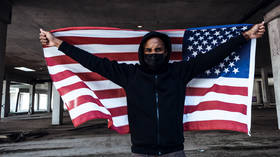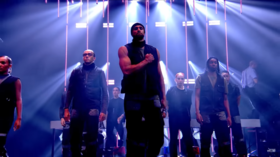African Americans want black national anthem and black-only towns, but that's borrowing from the white supremacist playbook

Under the pretense of ‘systemic racism’, black racial justice groups in the United States are advocating on behalf of radical measures that threaten to tear apart the colorful fabric of the diverse nation forever.
Just before his untimely death in 1968, civil rights leader Martin Luther King summed up the reality of the United States when he said, “We may have all come on different ships, but we’re in the same boat now.” The message was unmistakable: in order for the world’s greatest experiment in democracy and multiculturalism to succeed, its people must focus on what unites them as opposed to what drives them apart. Today, however, the “same boat” that King referenced is sinking below the waves of racial strife, and not even the sports world is exempt. In fact, it was on the ‘field of dreams’ where much of the current antagonism first began.
In 2016, former NFL quarterback-turned professional activist Colin Kaepernick ‘took a knee’ during the playing of the national anthem to protest police brutality. Predictably, the gesture polarized the country, even causing dedicated sports fans to change the channel.
Internal NFL memo sent to address concern as to why ratings this season are so far down 11% pic.twitter.com/SitMveCr8q
— Darren Rovell (@darrenrovell) October 7, 2016
The real challenge, however, came with the death of George Floyd, when local and state Democratic leaders, forced to respond to ‘peaceful’ street protests, found it more politically expedient to genuflect on behalf of the Black Lives Matters movement than to put an end to the violence. Since then, the demands on behalf of activist groups have not gone away; indeed, they have become ever more radicalized.
This week, the National Football League – where some 70 percent of players are black, by the way – kicked off the 2020 season by playing a rendition of the ‘black national anthem’, entitled ‘Lift Every Voice and Sing’. Needless to say, not a single player on the field was caught kneeling as that song rang out through a mostly-empty, pandemic-stricken stadium. Minutes later, however, dozens of players kneeled for the playing of ‘The Star-Spangled Banner’, written by Francis Scott Key to commemorate the American flag during the War of 1812.
The question of national allegiance notwithstanding, does America really need two national anthems? After all, that would only fuel the dangerous notion that there are two separate ‘nations’ with two separate peoples inside of one country. At the same time, who is going to break the news to America’s large Latino population, for example, or the Asian one, that they can’t have their own national anthems played at sporting events, too?
Although there are solid grounds for arguing (as my colleague Chris Sweeney has proposed on these pages) that the beloved ‘Star-Spangled Banner’ could do with a modern makeover in light of some of its racist overtones, should we really toss out the baby with the dirty bath water? Americans have already witnessed the removal of hundreds of statues of historical figures who had some connection to slavery and the oppression of minorities (and even some who do not); does the country really need to start trashing its oral and written record as well? That is a slippery slope that could lead to national disintegration.
The iconic Teddy Roosevelt statue in front of the Museum of Natural History on the west side of Central Park being removed. As a New Yorker and a museum nerd this one hurts. 😔 pic.twitter.com/StwBn9tfGk
— P🇺🇸NY (@PONY_Official) September 16, 2020
The very essence of this debate, however, ignores a crucial historical fact: although Americans are certainly guilty of many odious crimes against humanity, with slavery topping the list, few people have sacrificed more to correct those wrongs than the Americans themselves. The most obvious example is the Civil War (1861-1865), which was at least partially fought to end the institution of slavery and prevent the Confederate states from seceding from the Union. It is estimated that up to one million Americans lost their lives in that conflict. Yet today, with no loss of irony, some black people are attempting to ‘secede’ from the US with the goal of creating their own territory inside of the country.
This week it was reported that 19 families purchased 100 acres of land in Georgia to create a “safe haven” for black families.
“It's about a safe haven. It's about having a place where you can be authentically black, unapologetically black and not be judged,” Ashley Scott, one of the new residents of Liberty, Georgia, told local media. “Our 96 acres is to [serve as a] safe haven for … retreats, and reunions and weddings, trails for hunting, a lake for fishing and a place for us to just breathe.”
One of the main problems with that project, of course, is its glaring hypocrisy. After all, whenever white Americans have attempted in the past to create such ‘safe places’, the kneejerk reaction was to condemn them as ‘white supremacists’ and knuckle-dragging xenophobes. The other contradiction is that the creation of walled-off, race-based communities is fundamentally anti-American to the core. Black Americans seeking their own fenced-off land is no better than the white segregationist ‘back of the bus’ policies that led to the ferocious civil rights battles of the 1960s.
In other words, African Americans are wandering down the same dark alley that their white brothers did decades ago, and if they think the results will somehow turn out better for them this time around they are sadly mistaken. The way to cure racism in the United States is not by each racial group seeking shelter behind their own fortifications, behind their own anthems, behind their own flags, but rather for Americans to rally around the “solid rock of brotherhood,” to quote King once again. It is truly the only way forward.
Think your friends would be interested? Share this story!
The statements, views and opinions expressed in this column are solely those of the author and do not necessarily represent those of RT.














